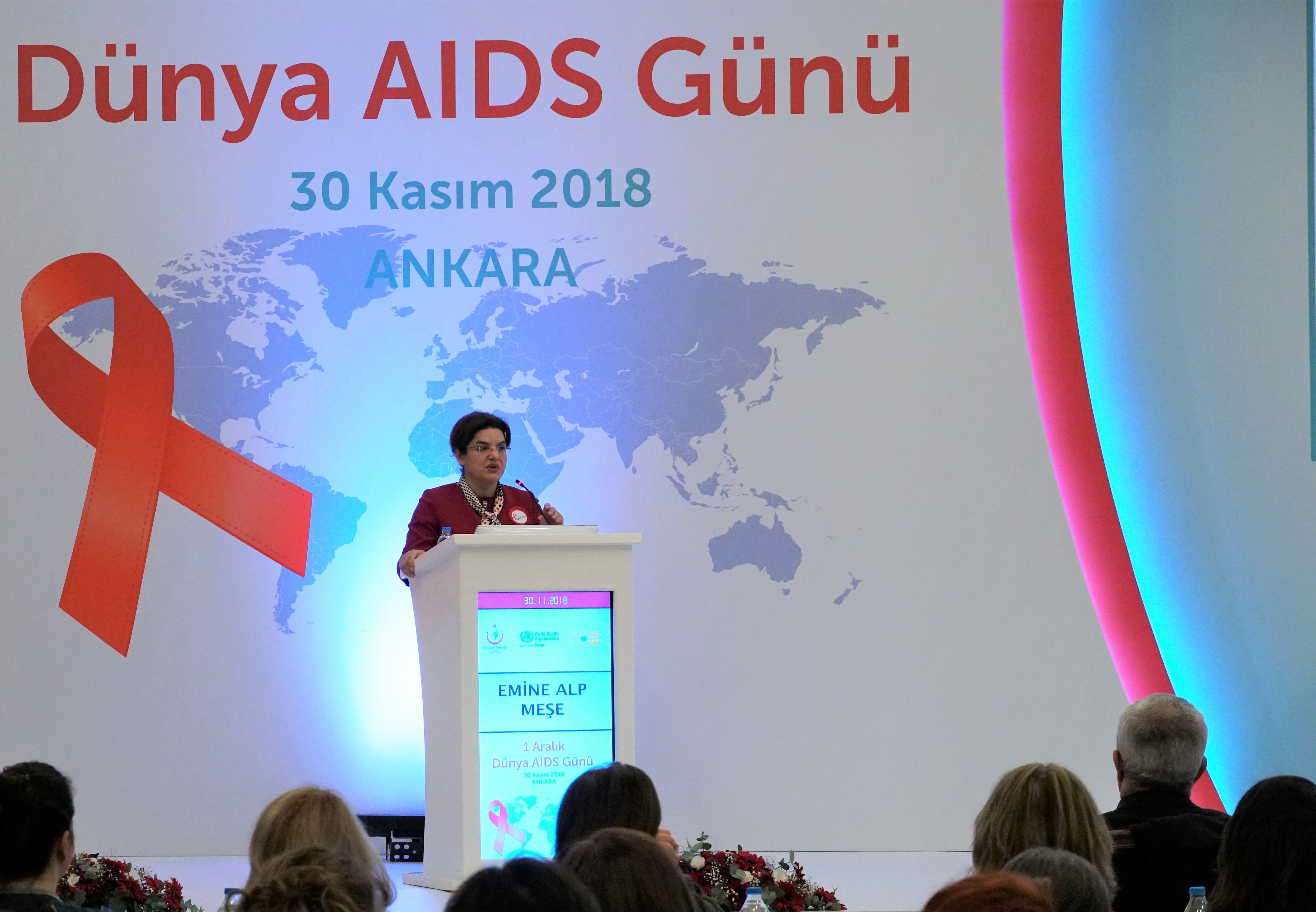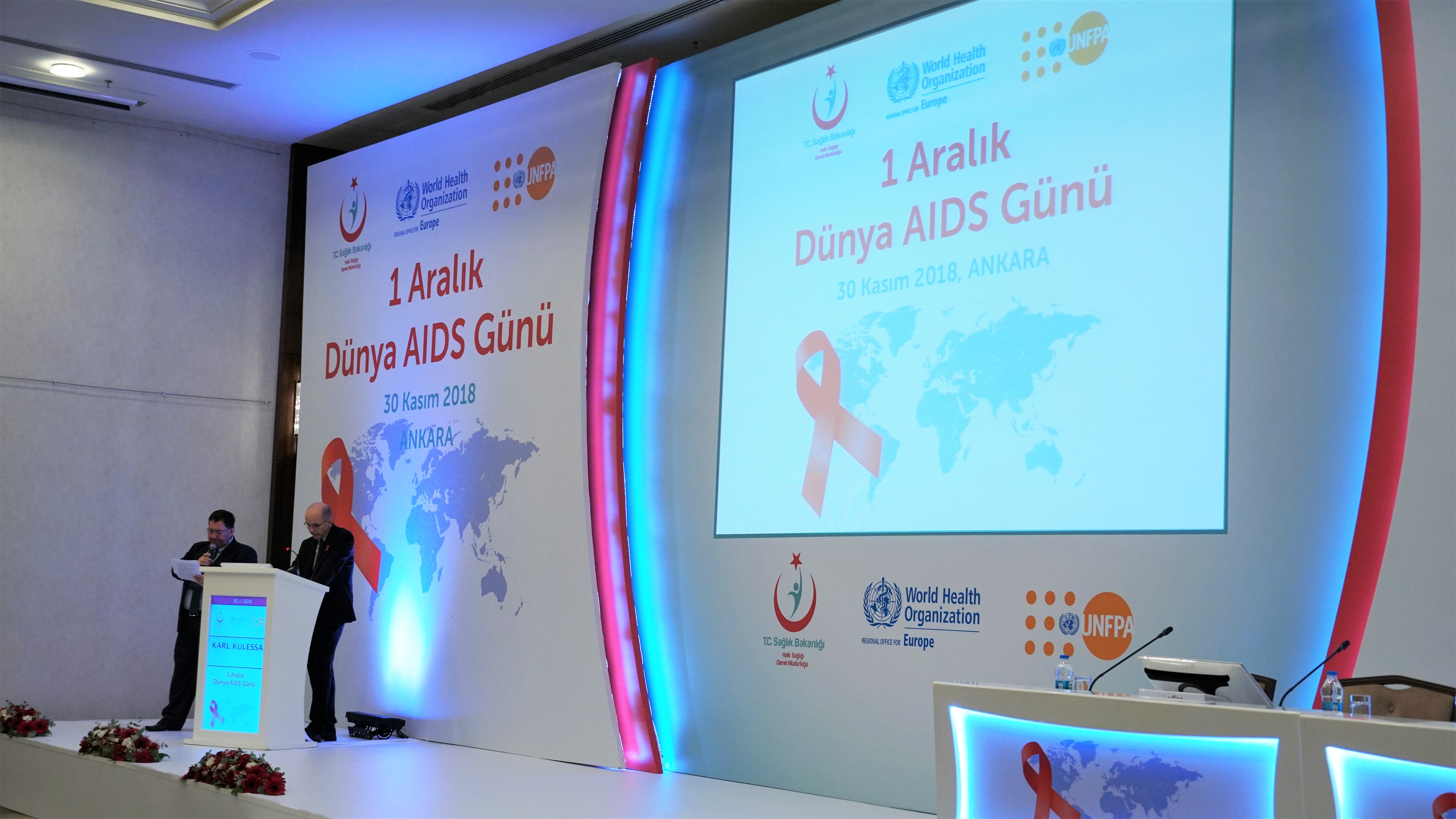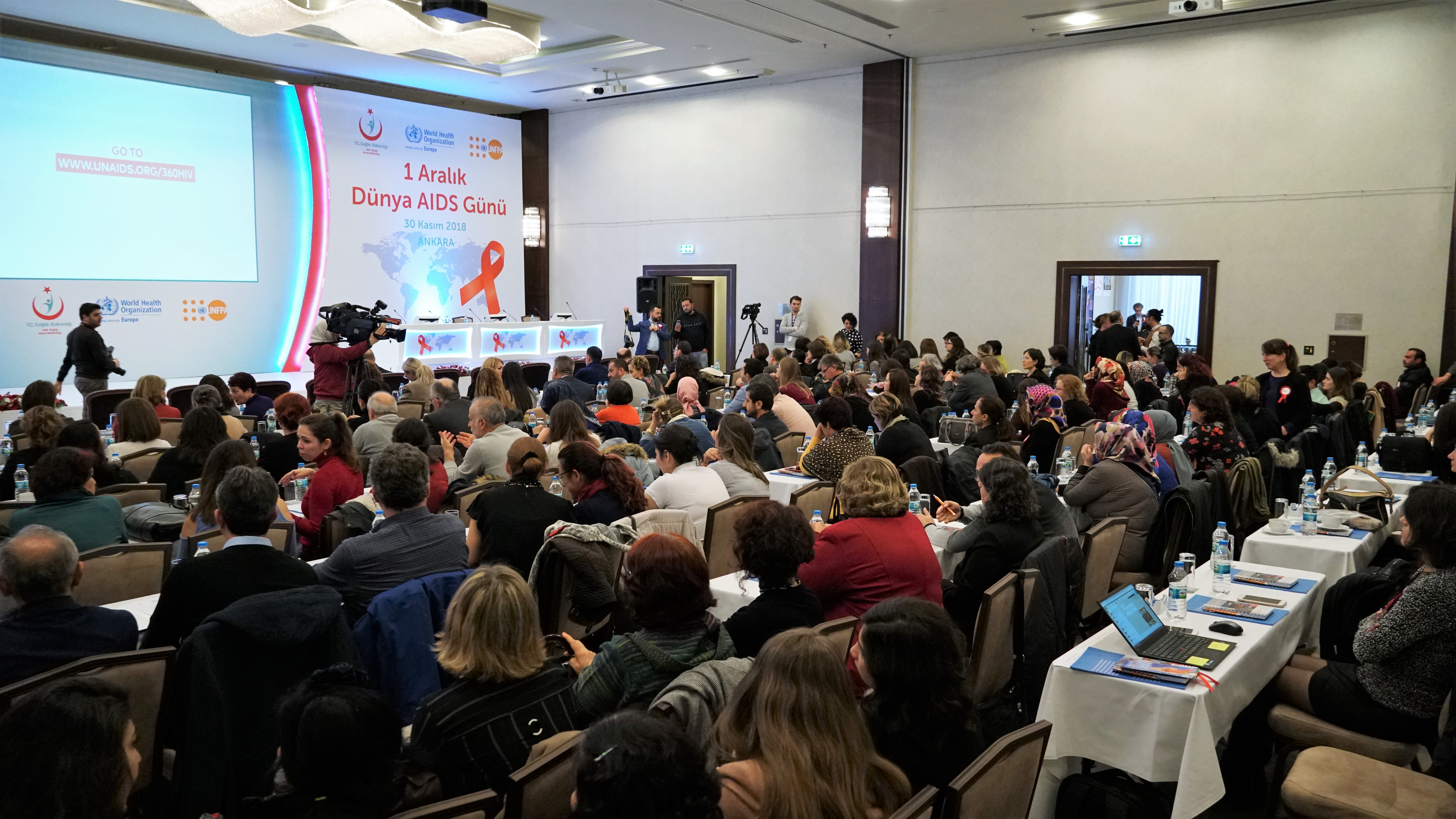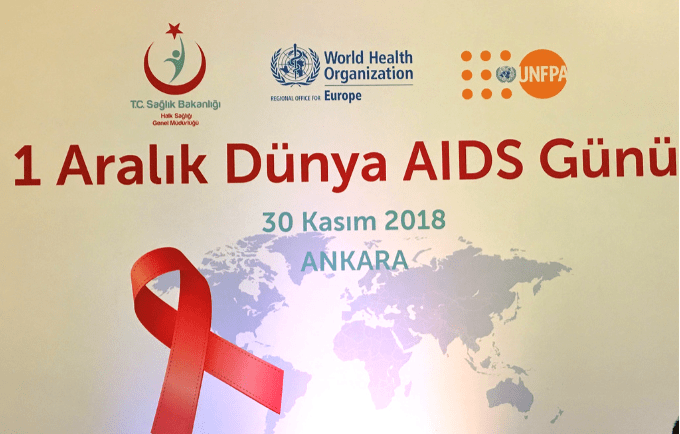30 November 2018, Ankara - The theme of this year’s December 1 World AIDS Day is “Knowladge is power’’. The latest report of UNAIDS drawn up in line with this theme shows that progress has been achieved in attempts to reach out more individuals living with HIV with intense testing and treatment programmes. Three fourths (75%) of the people living with HIV knew their status 2017, a rate showing a rise when compared with the rate of two thirds (67%) achieved in 2015. As far as access to antiretroviral treatment is concerned, while 17.2 million people living with HIV had access to this treatment in 2015, 21.7 million people (59%) benefited from this treatment in 2017. The report shows, however, that 9.4 million people across the world, who are not aware that they live with HIV, have to be urgently linked to HIV testing and treatment services.
On this important day, a conference was held in Ankara both to raise awareness and to share the latest developments and progress in combat with HIV/AIDS with the related stakeholders. The event was co-organised by the Ministry of Health, Directorate General of Public Health, United Nations Population Fund and World Health Organisation.
Among the 150 participants were also prominent guests who participated in the event as speakers such as Prof. Dr. Emine Alp Meşe, Vice Minister from the Ministry of Health, Dr. Ayla Aydın, Head of the Department of Contagious Diseases in the Directorate General of Public Health, Karl Kulessa, Representative of the United Nations Population Fund in Turkey and Pavel Ursu, Representative of the World Health Organisation in Turkey.

In her speech Prof. Dr. Emine Alp Meşe, Deputy Minister from the Ministry of Health, said: ‘’Following up the developments in this field for 20 years now, we know that it is an insidious disease’’. Dr. Meşe said that HIV has developed into an infection affecting people in all age groups, with 36.7 million people having to live with HIV all over the world. Adding that 18.557 AIDS cases have been recorded in Turkey since 1985, she said self-protection is the best way to protect oneself from the virus, which is much more affordable than treatment. Underlining that the Ministry of Health makes all the necessary efforts to ensure that people living with HIV can lead a normal life, Dr. Meşe further pointed out that risky individuals should undergo HIV testing in test centres, and that the ministry continues its efforts to increase the number of HIV test centres.
Dr. Ayla Aydın, Head of the Department of Contagious Diseases in the Directorate General of Public Health, who also spoke in the conference, said that activities aiming at raising awareness on AIDS are of great importance. She pointed out the fact that HIV continues to spread without discriminating any religious faith, language and racial origin and said that the aim is to eliminate the threat posed by HIV to public health until 2030, also underlining that HIV is a health problem that must be combated with the participation of all the sectors. She added that field surveys have revealed that especially young people are not sufficiently informed about the protection methods. She further said that activities in this respect will continue to be undertaken in cooperation with the United Nations Population Fund and the World Health Organisation.

Karl Kulessa, Representative of the United Nations Population Fund in Turkey, also made a speech during the conference, who said: “An easy access to correct and reliable information and protection methods is one of the essential principles with respect to sexual and reproductive health. This is especially the case for sexually transmitted diseases; correctly informed people will be better equipped in terms of setting better preferences. Combat with AIDS requires long-term investments. The global struggle led by the United Nations Population Fund in this regard consists of three important components: Defending human rights and reducing inequalities; integrating the combat with HIV into projects regarding sexual and reproductive health and ultimately ensuring that projects are executed to prevent HIV transmission through sex. In accordance with the Sustainable Development Goals the international community aims at eliminating the AIDS epidemic until 2030. We can achieve this goal only by using the protection methods. In this World AIDS Day, we, as the United Nations Population Fund, repeat our commitment to make comprehensive efforts with all our partners and using all our sources, so that larger masses have duly access to protection methods’’.
Pavel Ursu, Representative of the World Health Organisation in Turkey, who also spoke during the conference, emphasised the importance of such multi-partner projects with regard to the significant contribution they make to awareness raising in this respect. Underlining the need to develop necessary monitoring systems to support HIV + individuals, Ursu said that it is of vital importance to make investments to address this need. Ursu also shared statistical information with the participants: ‘’The latest data available for 2017 reveal that 1.8 million people were newly infected with HIV in 2017, of whom 75% are not aware of their status. Of this group, on the other hand, 55% received treatment, and only 47% had access to antiretroviral treatment. Our aim in the World Health Organisation is to achieve the 90-90-90 targets.’’
Yasin Eryakmaz, co-founder of the Association of Pozitif-iz, made a presentation titled ‘’Living with HIV’’ during the conference. He said: ‘’I am always thankful to be able to speak everywhere where people talk about AIDS. One of the most essential aims is to make people living with HIV feel themselves normal. Once diagnosed with HIV, you enter into a new world, a world that isolates you from society. It is of essential importance to be able to live with HIV to overcome the problems thereby experienced, because it is a disease not supported like others. You generally learn that you are HIV positive on an occasion of some other nature when you are not at all ready to hear it, namely when you present to a hospital for another disorder or as a result of a blood test before getting married, and your life changes from top to bottom.’’
In her speech during the conference, Dağlar Çilingir, Representative of the Association of Y-Peer in Turkey, said that they have been in close cooperation with young people in Turkey for 5 years now, underlining the importance of their activities with the younger generation, in view of the young population of 13 million in the country. Referring to data available, she said that HIV was seen in one third of this young population. Pointing out that young people are thirsty of information in this respect, she added that it is of great importance for the health of the younger population that the number of HIV test centres is increased. Underlining that peer education is of great value in respect of an easier communication between young people, Çilingir said, concluding her speech, that they make use of various expression tools such as theatre to enhance the communication with young people.

United Nations Population Fund (UNFPA)
The United Nations Population Fund (UNFPA) was established in 1969 as the biggest aid source with international funding in the area of population operating around the world. UNFPA operates in more than 150 countries for creating policies and strategies that support sustainable development. Having started its activities on a project basis, the United Nations Population Fund (UNFPA) has been working on reproductive health, encouraging social-gender equality, and collecting, using and distributing data about development and humanitarian aid in Turkey since 1971. Within this framework, the first Country Program lasted from 1988 to 1992 and now the Sixth Country Program (2016-2020) is being executed.
The United Nations Population Fund (UNFPA) works to deliver a world where every pregnancy is wanted, every childbirth is safe and every young person's potential is fulfilled. To this end, UNFPA especially focuses on the following five Sustainable Development Goals (SDGs);
SDG 3: Good health and well-being,
SDG 5: Gender Equality
SDG 10: Reduced Inequalities
SDG 16: Peace, Justice and Strong Institutions
SDG 17: Partnerships for Goals
Follow United Nations Population Fund (UNFPA) on social media:
Facebook: UNFPA.Turkey Twitter: UNFPATurkey Instagram: unfpa_turkey YouTube: UNFPATurke


